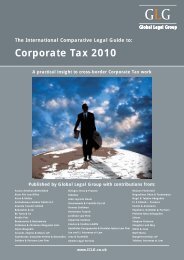BMR Edge-Tax & Regulatory Mont - BMR Advisors
BMR Edge-Tax & Regulatory Mont - BMR Advisors
BMR Edge-Tax & Regulatory Mont - BMR Advisors
Create successful ePaper yourself
Turn your PDF publications into a flip-book with our unique Google optimized e-Paper software.
The taxpayer, a foreign partnership firm established in Germany, was engaged in<br />
rendering management and technical consulting services through its Branch Office<br />
(“BO”) in India. During the relevant year under consideration, the taxpayer availed<br />
services from its group companies in relation to its projects in India. The taxpayer<br />
debited the payment for such services in its books of accounts and claimed a<br />
deduction for the same in its return of income while the payments were not actually<br />
made due to non-receipt of necessary approval from the Reserve Bank of India<br />
(“RBI”). During the course of the assessment proceedings, the AO held the payments<br />
to be in the nature of FTS and thus, taxable in India. Further, the taxpayer was<br />
treated as an agent of the group companies.<br />
Before the CIT(A), the taxpayer contended that the amount payable did not partake<br />
the character of income in the hands of its group companies as the necessary<br />
approval from the RBI under the Exchange Control regulations was not received.<br />
Rejecting the submissions of the taxpayer, the CIT(A) held that once the taxpayer had<br />
accounted for the invoices in its books and the effect of liability had been<br />
acknowledged by way of claiming a deduction, the income would be accrued during<br />
the year under consideration. As an alternate, the taxpayer also contended that even<br />
as per the specific language used in the relevant tax treaties, FTS could be taxed only<br />
when it was paid to the foreign entities and since the amounts of FTS had not been<br />
paid by the taxpayer in the year under consideration, the same could not be taxed in<br />
that year. The CIT(A), however, held the word ‘paid’ used in the relevant Article of the<br />
treaties dealing with FTS to denote ‘incurring of a liability’. On the said basis, the<br />
CIT(A) upheld the AO’s action.<br />
Aggrieved by the order of the CIT(A), the taxpayer filed an appeal with the ITAT.<br />
Ruling in favour of the taxpayer, the ITAT observed that the amount in question cannot<br />
be taxed in absence of necessary RBI approval. The ITAT further observed that as<br />
per the FTS Article under the relevant treaties (specifically with reference to German,<br />
Singapore and UK tax treaty), the amounts could be taxed only on payment basis and<br />
since the impugned amounts were never ‘paid’ to the foreign entities, the same could<br />
not be brought to tax.<br />
Booz Allen & Hamilton (India) Ltd v ADIT (ITA Nos 4503,4504,4506,4507 and 4508<br />
of 2003) (Mumbai ITAT)<br />
Interest under section 234C of the Act is not applicable when income is earned at fag<br />
end of the year<br />
The taxpayer, engaged in the business of real estate development, filed its return of<br />
income declaring income under the head ’profits and gains of business or profession’.<br />
The AO accepted the same after charging interest under section 234C of the Act.<br />
The taxpayer filed an application under section 154 of the Act stating that since<br />
income returned by it was earned at the end of the relevant financial year, the interest<br />
under section 234C of the Act for deferment in payment of advance tax cannot be<br />
charged and therefore, the same constitutes a mistake apparent from record. The<br />
application was disposed off by the AO without dealing with this issue.<br />
On appeal, the CIT(A) affirmed the order of the AO by observing that the exemption<br />
from the applicability of interest under section 234C of the Act was available only on<br />
capital gains and winning from lotteries etc; and not on income returned under the<br />
head ’profits and gains of business and profession’ under which the income of the<br />
taxpayer was offered to tax.<br />
Aggrieved by the order of the CIT(A), the taxpayer filed an appeal before the ITAT.<br />
Before the ITAT, the taxpayer reiterated the submissions made before the lower<br />
authorities. Ruling in favour of the taxpayer, the ITAT observed that where the<br />
taxpayer has earned income at fag end of the year he is not expected to estimate /<br />
imagine that he will earn that income and pay advance tax thereon. Accordingly, no<br />
interest could be charged in the case of the taxpayer.<br />
Lalitha Developers v DCIT (ITA No 770 of 2011) (Bangalore ITAT)<br />
Circular / Notifications<br />
Time limit for filing ITR – V extended<br />
Central Board of Direct taxes (“CBDT”) has extended the time limit to file form ITR-V<br />
for AY 2010-11 and AY 2011-12 to February 28, 2013. The time limit for filing ITR-V<br />
for AY 2012-13 has also been extended to March 31, 2013 or 120 days from the date<br />
of uploading the electronic return, whichever is later.<br />
Source: Notification No 1/2013, issued by CBDT<br />
Link: http://law.incometaxindia.gov.in/DIT/Notifications.aspx<br />
CBDT addresses issues faced by software export industry<br />
The CBDT has issued Circular providing clarifications on various issues relating to the<br />
export of computer software and allowance of deduction under sections 10A, 10AA
















